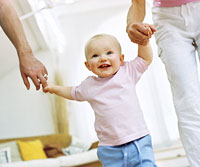
Preventing
PPD 
Getting help is important
Undetected and untreated Post Partum
Depression places the mother at risk for recurrent disease. Many
women with PPD are either undiagnosed, misdiagnosed, or seek no
medical assistance, therefore many women go without treatment.
Women at high risk for PPD should be identified prior to delivery.
It is very important to get early screening for depressive symptoms.
Early detection of disease gives better prognosis of disease and
may decrease the likelihood of high depressive symptoms. It is
very important to speak out about your feelings and your needs.
Visit your doctor and talk to him how you feel. Talk to your husband,
family, friends, and neighbors. Ask for help.
Social Support
It is very important that you get
support for yourself and communicate your needs to others. Ask
for help with taking care for a newborn baby. Your husband can
help taking care of baby. He can spend some quality time to bond
with a newborn baby. Meantime you can rest or sleep. Often friends
and family members want to help during the post-partum period.
Ask for help with housekeeping and preparing meals. Many people
who no longer have young children feel honored to be asked to
care for the baby for short periods. Let them rock or walk the
baby, give a feeding, or even change a diaper. Do not feel you
have to do it all yourself.
Self-care
strategies and practices
You can help your self.
Along with professional treatment, there are several other things
that you can do to help yourself to feel better.
New mothers with postpartum depression can practice a number of
self-care strategies. There are different techniques that can
help to cope with PPD, or prevent postpartum depression like;
making time to yourself, leave the house daily, rest whenever
possible, sleep when the infant sleeps, accept help offered, eat
abundant fruit and vegetables and keep caffeine and sugar to a
minimum.
Exercise
In depressed people has been
found decreased level of body's hormone serotonin. Serotonin is
hormone that regulates mood. The benefits of exercise in depression
are very well documented. Exercise can help treat depression by
releasing the serotonin, which elevates mood. In return, elevated
mood is providing a feeling of accomplishment, better perspective
on life, and enhancing self-esteem. Any physical activity is considered
as exercise. It is the best to be physically active 20 to 30 minutes
daily. Even you exercising as little as 10 minutes a day have
been found to have beneficial effects. Walking is simple form
of exercise and you can do it daily.
Meditation and Stress Reduction
Stress is risk factor for depression
can make depression worse and a newborn adds new stresses to a
woman's life. Learning to deal more effectively with stress may
reduce depression. The first step is to identify the main sources
of stress in your life and find the most effective way to cope
with that Ask for help identifying stressor and dealing with stress.
Also, identify stressors that you are putting on yourself as trying
to be "perfect" or doing too much by yourself. Set priorities
and let unnecessary tasks wait.
Promote sleep:
During post partum preiod mothers
usually do not slep enough and inadequate sleep can make depression
worse. It is hard to keep sleep cycle regular, therefore rest
whenever is possible, and sleep when the infant sleeps. Ask for
help and tray to develop relaxing bedtime rituals such as reading
or a warm bath.
Dietary changes:
Eating a well balanced diet
and regularly scheduled meals is important. Use daily multivitamins
and calcium. B vitamins (B6) may also decrease symptoms. Tray
to reduce sugar, caffeine, alcohol in diet. Take a lot fresh friuts
and vegetables, 100% juices, milk and water. Watch your portion
size and calorie intake.
Spend time with others:
Depressed women often withdraw from
others because they mistakenly feel they would not be good company.
Being with others is giving you another way to gain perspective,
which helps with the symptoms of depression. Consider joining
a support group for new mothers or even a support group for others
experiencing problems with depression.
Make time to do what you enjoy
Depressed women sometimes temporarily
lose the ability to enjoy themselves. Enjoyable activities makes
you feel better. Continue doing pleasurable activities even if
you don't feel like it. Soon, you will find that you have come
to enjoy yourself again.
Give yourself a break 
During post partum period, new mothers
are experiencing tremendous demand, especially first time mothers.
In this completely new situation, many new mothers do everything
by them self’s trying to be “a perfect mother".
To feel better takes time. To be able to handle the everyday pressures
as well as the demands of motherhood, tray to be realistic about
the demands and expectations you make on yourself. Make time for
relaxation and meditation. Simple breathing technique and meditation
can help reduce a stress.
-Top-